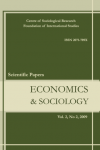RANKING THE IMPORTANCE OF
MULTI-CRITERIA EVALUATION
INDICATORS BASED ON THEIR
TRANSITIVITY
RANKING THE IMPORTANCE OF
MULTI-CRITERIA EVALUATION
INDICATORS BASED ON THEIR
TRANSITIVITY
Author(s): Romualdas Ginevičius, Joanicjusz Nazarko, Dainora Gedvilaitė, Vladislavas PetraškevičiusSubject(s): Evaluation research, Economic development, Socio-Economic Research
Published by: Fundacja Centrum Badań Socjologicznych
Keywords: multi-criteria methods; indicator importance ranking; significance determination; transitivity of indicators;
Summary/Abstract: In recent decades, multi-criteria methodshave been increasingly used for the quantitativeassessment of the development of socioeconomicsystems. Their essence lies in weighted indicators, i.e.,combining the values multiplied by the weights intoone summarizing index. However, determining thesignificance of indicators is important in suchapproaches. It can be done in one or two stages. Inthe first case, the significance is assessed immediately,in the second case, the importance ranks of theindicators are determined before the assessment.Today, most people are satisfied with the first method,i.e., determining significance without knowing theimportance ranks. This makes sense when the numberof indicators is small. Socio-economic phenomenaare, by their nature, complex and multifaceted, so inpractice they manifest in many aspects. Therefore,their condition can be adequately assessed only with alarge number of indicators. The significance of theindicators of such systems is assessed by comparingthe importance of paired indicators. However, in thepresence of a large number of indicators, there areconstantly recurring problems - excessive volumes ofexpert evaluations and, as a result, a decrease in theadequacy of the evaluation. Transitive analysis ofindex importance (TAII) is the proposedmethodology that allows to significantly increase thenumber of evaluated indicators while reducing thevolume of expert evaluations and increasing theiradequacy. This can be achieved by integrating theirtransitivity as a property into the ranking procedure ofdetermining the importance of indicators. In this way,the volume of expert evaluations can be reduced by40%. The suitability of the proposed methodology hasbeen verified using real problems.
Journal: Economics and Sociology
- Issue Year: 16/2023
- Issue No: 4
- Page Range: 309-320
- Page Count: 12
- Language: English

